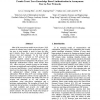270 search results - page 39 / 54 » Verifying Second-Level Security Protocols |
137
click to vote
IPPS
2007
IEEE
15 years 8 months ago
2007
IEEE
Most of the current trust models in peer-to-peer (P2P) systems are identity based, which means that in order for one peer to trust another, it needs to know the other peer’s ide...
126
click to vote
ESORICS
2008
Springer
15 years 4 months ago
2008
Springer
Abstract. Identity fraud (IDF) may be defined as unauthorized exploitation of credential information through the use of false identity. We propose CROO, a universal (i.e. generic) ...
CORR
2006
Springer
15 years 2 months ago
2006
Springer
Although good encryption functions are probabilistic, most symbolic models do not capture this aspect explicitly. A typical solution, recently used to prove the soundness of such ...
125
click to vote
PKC
1999
Springer
15 years 6 months ago
1999
Springer
Firewalls typically filter network traffic at several different layers. At application layer, filtering is based on various security relevant information encapsulated into proto...
136
click to vote
POLICY
2001
Springer
15 years 7 months ago
2001
Springer
IPSec (Internet Security Protocol Suite) functions will be executed correctly only if its policies are correctly specified and configured. Manual IPSec policy configuration is inef...

